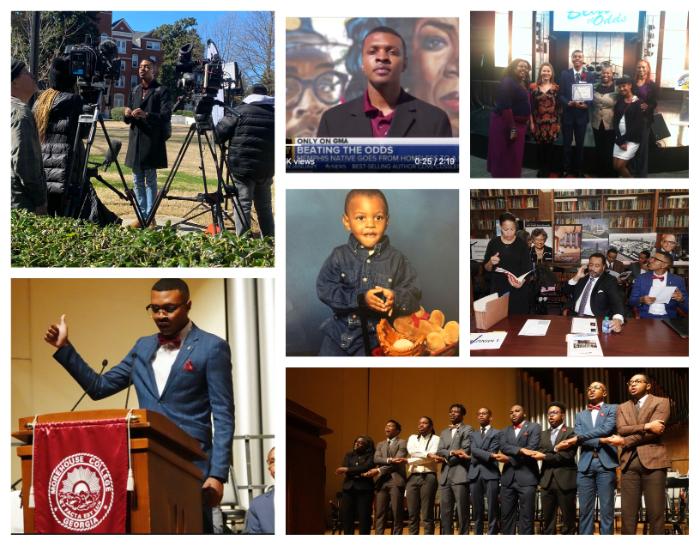Back To Blog
Secret Benefactor Paid for Dacavien Reeves To Become a Successful Morehouse Man
December 12, 2020Written by: Morehouse College
Dacavien Reeves has a stranger to thank for the life he is leading now after graduating cum laude from Morehouse College with a business degree. For one thing, he’s no longer homeless. He wakes up in his one-bedroom apartment (located in a nice neighborhood in Plano, Texas), after sleeping soundly on a Memory Foam mattress in a bed he chose for comfort. He opens the refrigerator that he filled with his favorite food. He sits on the sofa he bought. And if he is so inclined, he has room to pace the floor or dance across it.
And then there’s the 65-inch flat screen TV—and the Nissan Altima that gets him to the gym and back.
“When I was growing up, I always had to live life on the edge, 24-7,” said Reeves, who is now an asset and wealth management analyst at JPMorgan Chase & Co. “Now, I can walk around my apartment. I don’t worry about bills. I have the peace that I’ve always wanted.”
Today, on Sunday, Dec. 13, Reeves formally graduated with the Class of 2020. He hopes that his benefactor was watching or will tune in later to see it on YouTube.
All that Reeves wants to do now is bear hug the kind stranger who paid his bill in full. His anonymous benefactor invested more money in him than anyone ever has—as much as $100,000 for four years of tuition at Morehouse plus expenses. And the donor gave without ever meeting or talking to Reeves or asking for anything in return. Reeves knows very little about him other than he is a man who believed in him when others would have questioned whether it was possible for a teen like him to live to see his 20s, let alone attend, and excel, at Morehouse College.
“If I could say one thing to him today it would be a huge thank you for giving me the opportunity to have a better life,” said Reeves. “That could have been anybody but me.”
Saying Reeves’ life was difficult before Morehouse would be putting it mildly. His family had been living paycheck to paycheck for years until the money couldn’t stretch any further. Reeves, his mom, and two young siblings, who are four and five years younger than him, moved more than 10 times while he was in high school—including during senior year when key homework assignments were due, exams were scheduled, and he needed Wi-Fi to complete his college applications.
Reeves says things got really bad when his mother, Tasha Graham, fell ill. She was diagnosed with a serious cardiovascular condition and could not afford to cover her medical care and keep up with the rent. So, the family did what most families do in their situation, move from motel to motel, call on family, and squat in homeless shelters overnight until more affordable housing became available and their name was called on the list.
The man of the house, Reeves worked part-time at Burger King, took care of his young brother and sister, and sat up all night with his mom when she went to the hospital. “We barely had a car at first and lived off bus passes. We barely had clothes or could wash them. I barely could cut my hair,” he said. “Sometimes, our meals for the day were the meals we ate at school.”
On top of all that, Reeves had school. By day, he remained upbeat: He smiled and prayed his way through his frustration and exhaustion. The teachers considered him a student leader.
Then, after school, Reeves picked up his younger siblings and went to the library, where he served as a volunteer in the Cloud 901 Teen Learning Lab. He received leadership training and had a computer there to do his homework.
When the library closed, however, Reeves and his siblings had to wait at the McDonald’s near his mom’s IRS job until she got off work at 1 a.m. The shelter had a rule: Kids could not check in without a parent.
Everything changed the evening McDonald’s closed early. Reeves was 16. That night he walked the streets of Memphis dragging his tired brother and sister by the hands. He was frightened and needed help, so he called his advisers at the Memphis Mentors Ambassadors Program, a year-round development and enrichment outreach that serves hundreds of youths in the City of Memphis. “I didn’t know what to do or where to go,” he recalled.
His Youth Specialist with the Ambassadors Program, Harry Cash, came immediately and didn’t stop helping Reeves until he found the family a place to live. He notified Reeves’ high school about the predicament, and accompanied Reeves’ mother to meet with school counselors. Meanwhile, Reeves negotiated with his teachers at Watkins Overton High School until they agreed to give him time to make up his missed work. Reeves also finished his college applications.
“When I first got accepted into Morehouse it was one of the happiest days of my life, but I didn’t know if I would be able to afford it,” Reeves recalled. A state school that had accepted him was less expensive. “My mentor, Mr. Deron Hall, did this exercise with me that I remember to this day. He told me to envision how I wanted to live my life in the future. And then he asked me, ‘Now which school do you think will allow you to live the life that you saw?’”
Reeves attended Admitted Students Day at Morehouse with Hall and his other mentor Anjelica Hardin-Hall. Then, they began to raise money for his education through a GoFundMe campaign. Reeves continued to work part-time as an intern at Memphis Music Initiative. He even started a club at school, B.A.S.I.C. (Brothers and Sisters Inspiring Change), to help teens in crisis.
Soon, an online journalist heard about the enterprising teen and wrote a feature for the Connecting Memphis Facebook page. It went viral. TV interviews followed.
Eventually, Reeves got his miracle. He says he was sitting in church in summer 2016 listening to a sermon about trusting in God for a blessing. When it was time for the offering, Reeves gave more than $100 of the money he had earned from working as intern for months. “I told my mom, ‘I think I am supposed to give.’ Something was pulling in my heart.”
The next day, Reeves says his mentor Deron Hall called him with a surprise. “He told me, ‘A man has offered to pay for your entire tuition at Morehouse College!” I was floored. “I’ve never had that opportunity to just focus on school before. For the first time, I was free.”
At Morehouse, Reeves served as an inspiration to his peers. He never tried to hide his scars to fit in. He spoke openly about being homeless, hungry, and still having hope. When he struggled as a student, his Morehouse brothers tutored him. And when he was feeling down, they were there to talk past 3 a.m. Soon, Reeves’ abilities as a scholar and leader were rewarded by his professors. He was chosen to be a Presidential Ambassador, promoted to lead resident advisor for two years, and inducted into the Phi Tau Sigma Honor Society.
“Professor Rebecca Kumar and Robert Brown helped me to learn how to critically think about social issues,” he said. “They also both helped me acknowledge my own brilliance and potential, and taught me to never shy away from it again. For that, I am forever grateful.”
During the summers, Reeves kept busy. He was an intern with John Hopkins Center for Talented Youth, then at the City of Memphis’ Housing and Community Development authority serving homeless families. By junior year, he’d landed an internship at JPMorgan Chase & Co. in New York City. He did so well he left with a job offer at the start of his senior year.
His mother, who is much better now, is thrilled with his success. She beams when she sees him, though she worries about him being so far from home.
And as Reeves climbs his way up the ladder at JPMorgan, he says he will eventually go to law school on the side and maybe try politics. He also dreams of becoming a TV talk show host. With his life-changing experiences, Reeves says he feels called to pay it forward and help someone in need, just as his mentors and secret benefactor did for him.
“Your trajectory can look distorted when you can’t see past your current situation,” Reeves said. “Morehouse helped me to realize that sometimes your dream might not look like the clear path that someone else took, but it doesn’t mean you can’t build your own road.”

Dacavien Reeves is a member of the Class of 2020.
Dacavien Reeves

Your trajectory can look distorted when you can’t see past your current situation. Morehouse helped me to realize that sometimes your dream might not look like the clear path that someone else took, but it doesn’t mean you can’t build your own road.
Dacavien Reeves, Class of 2020
Tag(s):
morehouse college
,
scholar
,
Dacavien Reeves
,
commencement
,
D. Aileen Dodd
,
Inside Morehouse
,
Story